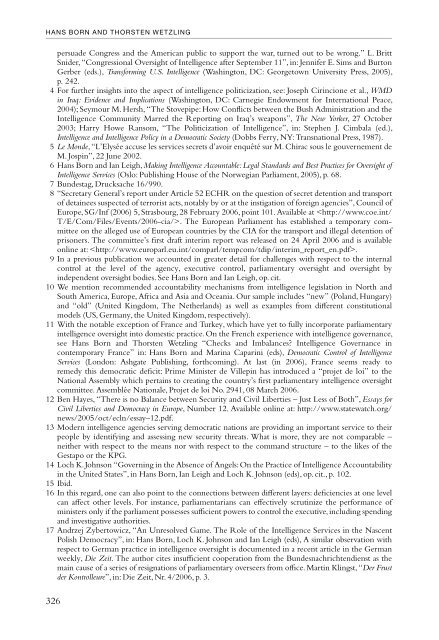Handbook of intelligence studies / edited by
Handbook of intelligence studies / edited by
Handbook of intelligence studies / edited by
You also want an ePaper? Increase the reach of your titles
YUMPU automatically turns print PDFs into web optimized ePapers that Google loves.
HANS BORN AND THORSTEN WETZLING<br />
persuade Congress and the American public to support the war, turned out to be wrong.” L. Britt<br />
Snider, “Congressional Oversight <strong>of</strong> Intelligence after September 11”, in: Jennifer E. Sims and Burton<br />
Gerber (eds.), Transforming U.S. Intelligence (Washington, DC: Georgetown University Press, 2005),<br />
p. 242.<br />
4 For further insights into the aspect <strong>of</strong> <strong>intelligence</strong> politicization, see: Joseph Cirincione et al., WMD<br />
in Iraq: Evidence and Implications (Washington, DC: Carnegie Endowment for International Peace,<br />
2004); Seymour M. Hersh, “The Stovepipe: How Conflicts between the Bush Administration and the<br />
Intelligence Community Marred the Reporting on Iraq’s weapons”, The New Yorker, 27 October<br />
2003; Harry Howe Ransom, “The Politicization <strong>of</strong> Intelligence”, in: Stephen J. Cimbala (ed.),<br />
Intelligence and Intelligence Policy in a Democratic Society (Dobbs Ferry, NY: Transnational Press, 1987).<br />
5 Le Monde, “L’Elysée accuse les services secrets d’avoir enquêté sur M. Chirac sous le gouvernement de<br />
M. Jospin”, 22 June 2002.<br />
6 Hans Born and Ian Leigh, Making Intelligence Accountable: Legal Standards and Best Practices for Oversight <strong>of</strong><br />
Intelligence Services (Oslo: Publishing House <strong>of</strong> the Norwegian Parliament, 2005), p. 68.<br />
7 Bundestag, Drucksache 16/990.<br />
8 “Secretary General’s report under Article 52 ECHR on the question <strong>of</strong> secret detention and transport<br />
<strong>of</strong> detainees suspected <strong>of</strong> terrorist acts, notably <strong>by</strong> or at the instigation <strong>of</strong> foreign agencies”, Council <strong>of</strong><br />
Europe, SG/Inf (2006) 5, Strasbourg, 28 February 2006, point 101. Available at . The European Parliament has established a temporary committee<br />
on the alleged use <strong>of</strong> European countries <strong>by</strong> the CIA for the transport and illegal detention <strong>of</strong><br />
prisoners. The committee’s first draft interim report was released on 24 April 2006 and is available<br />
online at: .<br />
9 In a previous publication we accounted in greater detail for challenges with respect to the internal<br />
control at the level <strong>of</strong> the agency, executive control, parliamentary oversight and oversight <strong>by</strong><br />
independent oversight bodies. See Hans Born and Ian Leigh, op. cit.<br />
10 We mention recommended accountability mechanisms from <strong>intelligence</strong> legislation in North and<br />
South America, Europe, Africa and Asia and Oceania. Our sample includes “new” (Poland, Hungary)<br />
and “old” (United Kingdom, The Netherlands) as well as examples from different constitutional<br />
models (US, Germany, the United Kingdom, respectively).<br />
11 With the notable exception <strong>of</strong> France and Turkey, which have yet to fully incorporate parliamentary<br />
<strong>intelligence</strong> oversight into domestic practice. On the French experience with <strong>intelligence</strong> governance,<br />
see Hans Born and Thorsten Wetzling “Checks and Imbalances? Intelligence Governance in<br />
contemporary France” in: Hans Born and Marina Caparini (eds), Democratic Control <strong>of</strong> Intelligence<br />
Services (London: Ashgate Publishing, forthcoming). At last (in 2006), France seems ready to<br />
remedy this democratic deficit: Prime Minister de Villepin has introduced a “projet de loi” to the<br />
National Assembly which pertains to creating the country’s first parliamentary <strong>intelligence</strong> oversight<br />
committee. Assemblée Nationale, Projet de loi No. 2941, 08 March 2006.<br />
12 Ben Hayes, “There is no Balance between Security and Civil Liberties – Just Less <strong>of</strong> Both”, Essays for<br />
Civil Liberties and Democracy in Europe, Number 12. Available online at: http://www.statewatch.org/<br />
news/2005/oct/ecln/essay–12.pdf.<br />
13 Modern <strong>intelligence</strong> agencies serving democratic nations are providing an important service to their<br />
people <strong>by</strong> identifying and assessing new security threats. What is more, they are not comparable –<br />
neither with respect to the means nor with respect to the command structure – to the likes <strong>of</strong> the<br />
Gestapo or the KPG.<br />
14 Loch K. Johnson “Governing in the Absence <strong>of</strong> Angels: On the Practice <strong>of</strong> Intelligence Accountability<br />
in the United States”, in Hans Born, Ian Leigh and Loch K. Johnson (eds), op. cit., p. 102.<br />
15 Ibid.<br />
16 In this regard, one can also point to the connections between different layers: deficiencies at one level<br />
can affect other levels. For instance, parliamentarians can effectively scrutinize the performance <strong>of</strong><br />
ministers only if the parliament possesses sufficient powers to control the executive, including spending<br />
and investigative authorities.<br />
17 Andrzej Zybertowicz, “An Unresolved Game. The Role <strong>of</strong> the Intelligence Services in the Nascent<br />
Polish Democracy”, in: Hans Born, Loch K. Johnson and Ian Leigh (eds), A similar observation with<br />
respect to German practice in <strong>intelligence</strong> oversight is documented in a recent article in the German<br />
weekly, Die Zeit. The author cites insufficient cooperation from the Bundesnachrichtendienst as the<br />
main cause <strong>of</strong> a series <strong>of</strong> resignations <strong>of</strong> parliamentary overseers from <strong>of</strong>fice. Martin Klingst, “Der Frust<br />
der Kontrolleure”, in: Die Zeit, Nr. 4/2006, p. 3.<br />
326
















